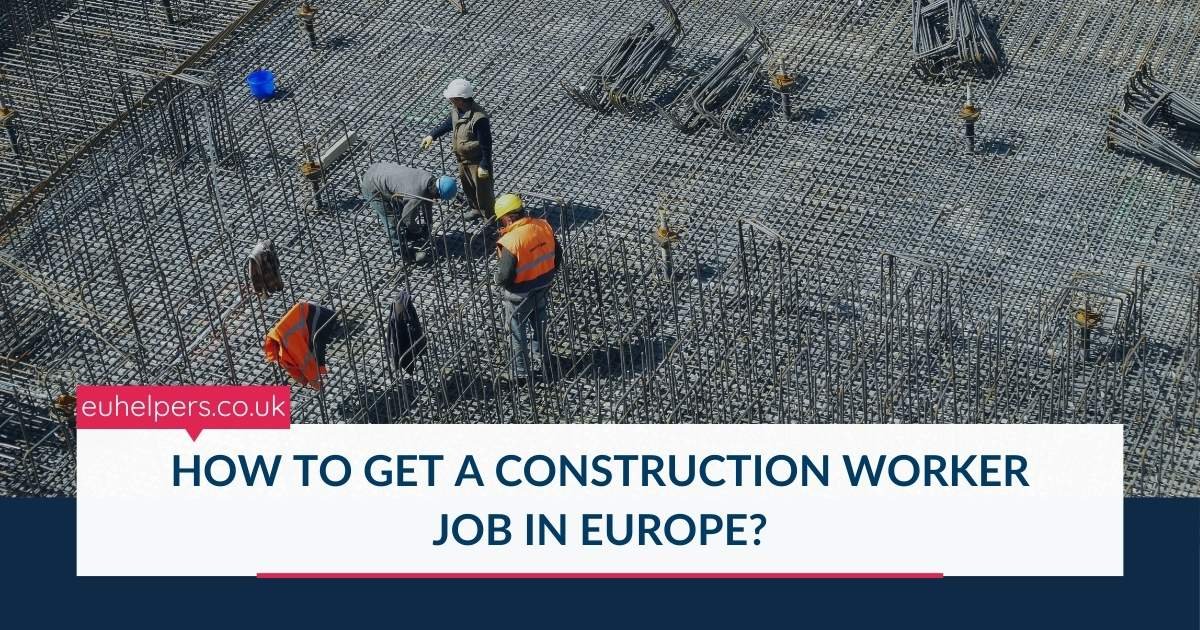The construction sector in Europe is one of the biggest employers of foreign workers. From building residential homes and offices to large infrastructure projects, construction companies across Europe are constantly looking for skilled and semi-skilled laborers. For migrants and non-EU workers, construction jobs are a practical way to secure steady employment, gain experience, and build a long-term career abroad.
Why choose construction jobs in Europe
-
High demand: Europe faces labor shortages in the construction sector.
-
Entry opportunities: Many roles don’t require advanced education.
-
Stable wages: Workers are often paid above the minimum wage with overtime options.
-
Career progression: Possibility to move into specialized trades (masonry, carpentry, painting, electrical, plumbing).
-
Visa sponsorship potential: Some construction companies hire and sponsor foreign workers.
Requirements for construction work
To work legally in Europe as a construction worker, you typically need:
-
A valid work visa or permit (for non-EU citizens)
-
Physical fitness for heavy labor, lifting, and long shifts
-
Basic knowledge of tools and safety rules (often provided in training)
-
Experience or certification in trades (optional but preferred)
-
Language skills in English or the local language (German, French, Spanish, Dutch, etc.)
? Many employers also require safety training certificates such as OSHA or local equivalents.
Average wages for construction workers in Europe (2025)
Salaries differ by country, experience, and role. Here are approximate earnings:
-
Germany: €13–€20 per hour (depending on skills)
-
France: €12–€18 per hour
-
Spain: €1,200–€1,600 per month
-
Italy: €8–€12 per hour
-
Netherlands: €14–€20 per hour
-
UK: £12–£18 per hour (higher in big cities and large projects)
? Skilled workers (bricklayers, electricians, welders, crane operators) usually earn more than general laborers.
Types of construction jobs available
-
General laborers – assisting skilled workers, carrying materials, site preparation
-
Masons and bricklayers – laying bricks, concrete, and stonework
-
Carpenters – wooden structures, flooring, and interiors
-
Painters and decorators – finishing and surface treatments
-
Electricians & plumbers – technical trades (require certification)
-
Heavy equipment operators – cranes, diggers, forklifts
-
Supervisors & foremen – experienced staff managing teams
Where to find construction jobs in Europe
-
Job portals: EURES (EU mobility portal), Indeed, Glassdoor, EuroJobs
-
Construction companies: Skanska, Vinci, Hochtief, Strabag, Bouygues, BAM Group
-
Recruitment agencies: Specialized in hiring migrant workers for construction sites
-
Local classifieds: Regional newspapers, Facebook job groups, and local boards
-
Trade unions and guilds: Some countries list construction vacancies through labor organizations
Tips for getting hired faster
-
Prepare a CV highlighting any trade or labor experience.
-
Mention special skills like masonry, welding, or operating heavy machinery.
-
Apply directly to large construction companies for higher chances of sponsorship.
-
Take short safety or trade courses to improve your profile.
-
Be open to relocation and flexible shifts, as projects vary by city and season.
Challenges in construction jobs
-
Physically demanding work with long hours in outdoor conditions.
-
Seasonal contracts may affect job stability.
-
Language barriers can make communication on site difficult.
-
Strict safety rules must be followed at all times.
Construction worker jobs in Europe are among the most accessible opportunities for foreign workers. With growing demand in both residential and industrial projects, companies are keen to hire laborers, helpers, and skilled tradespeople. While the work is physically challenging, it offers stable wages, visa sponsorship potential, and a pathway to long-term careers in Europe. If you have the stamina, skills, and flexibility, construction work could be the right starting point for your European journey.

